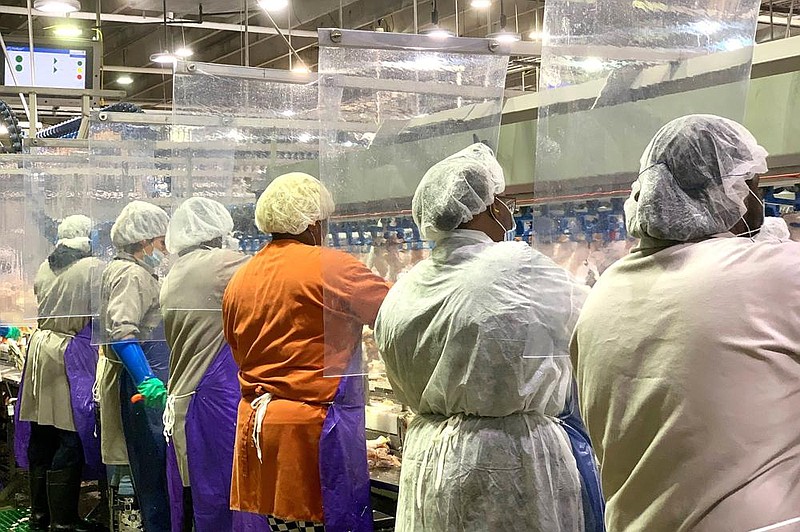China suspended poultry imports from a Tyson Foods Inc. plant where hundreds of employees tested positive for covid-19, stoking concerns over the broader implications for U.S. and global meat exports.
All products from the plant in Springdale, where Tyson is based, that are about to arrive in China or have arrived at the country's ports will be seized, customs officials announced Sunday. The suspension is an about face from just a few days ago, when Chinese officials said food was unlikely to be responsible for a fresh virus outbreak in Beijing.
Tyson said Friday that 13% of its workers tested positive for the virus at plants in Northwest Arkansas.
The move is a potential new threat to meat plants across the world that have seen slaughter disruptions because of the virus. In the U.S., hundreds of workers have become ill, and dozens have died. There's also been a recent uptick in infections at facilities in Brazil and Germany.
"There are worries in China over serious coronavirus outbreaks in the U.S.," said Lin Guofa, a senior analyst at Bric Agriculture Group, a Beijing-based consulting firm. The public is worried about imported frozen products as almost all cases in Beijing have been connected to a meat and frozen fish wholesale market, he said.
China imports most of its poultry from Brazil, while the U.S. makes up just a small percentage of imports, Lin said.
A new outbreak in China had been blamed on imported salmon after the head of a food market where clusters were detected said the virus had been traced to a chopping board used by a fish seller.
If China continues to suspend shipments based on coronavirus cases reported at processing plants, it could also threaten to undermine promised agricultural purchases as part of the Washington-Beijing trade deal.
Tyson said in a statement Sunday it was looking into the report and cited statements from the World Health Organization and the Centers for Disease Control and Prevention that there's no evidence virus transmission is associated with food.
[CORONAVIRUS: Click here for our complete coverage » arkansasonline.com/coronavirus]
Tyson's shares fell 2.85% Monday in New York.
China had backed off from its previous stance linking food to virus cases. A customs official at a briefing on Friday said the country was taking the advice of international organizations that there's a low risk of imported food transmitting the virus, and no food restrictions would be imposed.
But the move to block the Tyson shipments runs counter to that, and reverts the country back to increasing its scrutiny over imported food. Meanwhile, a German abattoir last week voluntarily halted pork exports to China after workers were found to be infected.
China's customs department said over the weekend that one poultry company in Britain reported covid-19 cases. While the U.K. isn't allowed to export poultry to the Asian nation, its authorities have agreed to take measures to prevent the virus from contaminating pork and beef exports to China, and will inform the Asian nation whenever exporters have any outbreaks.
China's customs authorities had started testing all shipments of imported meat for the virus, while officials in some major cities were also checking the products at domestic markets. In a statement last week, China Customs said all 32,174 samples of imported seafood, meat, vegetables, fruit and other related products had tested negative.
The country's scrutiny may end up having a big impact on global food shipments. Its surging imports of meat had helped to buoy U.S. and Brazilian producers of poultry, pork and beef, both before the nation's virus outbreak in January and as global trade has staged a nascent recovery in recent weeks with the country exiting lockdowns.
At the same time, China's market is facing a chicken surplus from its own production and stagnating demand, Bric Agriculture's Lin said.
Also Sunday, a southwest Missouri county that is home to a Tyson poultry processing plant announced it has doubled its number of new coronavirus cases.
McDonald County, which has about 23,000 residents, added 196 new cases Sunday, resulting in a cumulative total of 434 cases, according to McDonald County Public Health Administrator Paige Behm.
The county is home to two poultry processing facilities: one in Noel owned by Tyson Foods, and another in Southwest City, owned by Simmons Foods.
The new cases can be attributed to combined results of community testing and testing of Tyson workers, according to Behm. She would not comment on how many of the new cases were of Tyson workers.
"I can say we are seeing quite a few cases coming from the poultry industry and poultry workers," Behm said.
Information for this article was contributed by Marion Dakers and Michael Hirtzer of Bloomberg News and by staff members of The Kansas City Star.
